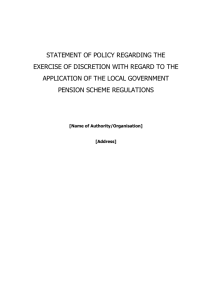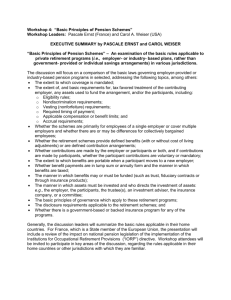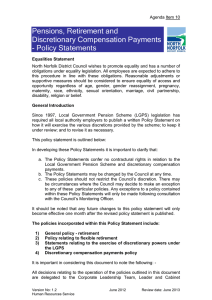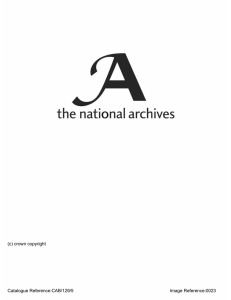Pensions, Retirement and Discretionary Compensation Payments - Policy Statements
advertisement
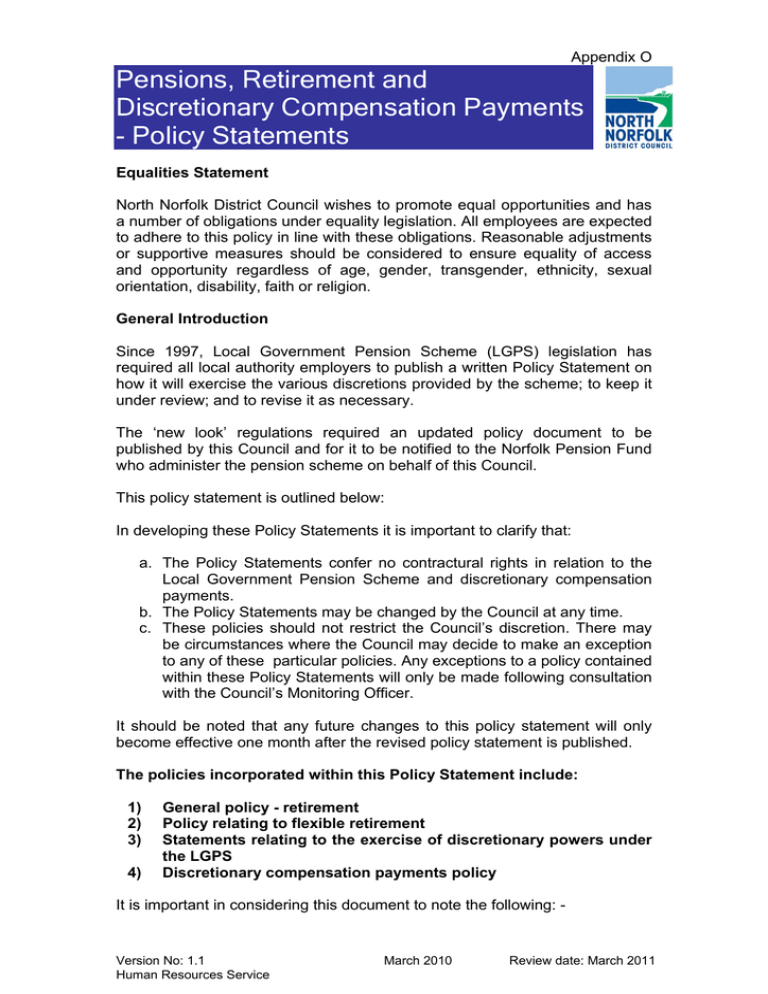
Appendix O Pensions, Retirement and Discretionary Compensation Payments - Policy Statements Equalities Statement North Norfolk District Council wishes to promote equal opportunities and has a number of obligations under equality legislation. All employees are expected to adhere to this policy in line with these obligations. Reasonable adjustments or supportive measures should be considered to ensure equality of access and opportunity regardless of age, gender, transgender, ethnicity, sexual orientation, disability, faith or religion. General Introduction Since 1997, Local Government Pension Scheme (LGPS) legislation has required all local authority employers to publish a written Policy Statement on how it will exercise the various discretions provided by the scheme; to keep it under review; and to revise it as necessary. The ‘new look’ regulations required an updated policy document to be published by this Council and for it to be notified to the Norfolk Pension Fund who administer the pension scheme on behalf of this Council. This policy statement is outlined below: In developing these Policy Statements it is important to clarify that: a. The Policy Statements confer no contractural rights in relation to the Local Government Pension Scheme and discretionary compensation payments. b. The Policy Statements may be changed by the Council at any time. c. These policies should not restrict the Council’s discretion. There may be circumstances where the Council may decide to make an exception to any of these particular policies. Any exceptions to a policy contained within these Policy Statements will only be made following consultation with the Council’s Monitoring Officer. It should be noted that any future changes to this policy statement will only become effective one month after the revised policy statement is published. The policies incorporated within this Policy Statement include: 1) 2) 3) 4) General policy - retirement Policy relating to flexible retirement Statements relating to the exercise of discretionary powers under the LGPS Discretionary compensation payments policy It is important in considering this document to note the following: - Version No: 1.1 Human Resources Service March 2010 Review date: March 2011 Appendix O All decisions relating to the operation of the policies outlined in this document are delegated to the Corporate Management Team, Leader and Cabinet Member for Human Resources following consultation with the Council’s s151 Officer, Monitoring Officer and the Organisational Development Manager. A subsequent report would be made to Cabinet for information. Version No: 1.1 Human Resources Service March 2010 Review date: March 2011 Appendix O 1) General Policy - retirement The Council’s policy relating to employee retirement is: a. All employees are able to continue to work up to the day before their 75th birthday, on becoming 75 years of age they must then retire from working b. Employees who wish to retire from their employment are required to give notice of their intended date of retirement to their manager in writing. The length of notice required must be at least the same as the notice required to resign from employment. However, employees are encouraged to give an early indication of their planned retirement date c. Retirement from employment does not establish entitlement to either occupational or state pension benefits. Equally this policy does not change an employee’s entitlements as a member of an occupational pension scheme. Employees who are members of the LGPS are advised to seek advice about the impact of their planned retirement date on their Pension benefits. This is particularly important where the employee is planning on retiring either earlier or later than the retirement age of the LGPS which is 65 d. Employees who are members of the LGPS can elect to retire and receive their benefits from age 60 onwards e. Employees aged between 55* 1 and 59 may with the Council’s consent retire earlier or opt for flexible retirement provided a full business case is approved by CMT. 2) Policy Relating to Flexible Retirement Flexible retirement occurs where an employee draws their pension and carries on working, either at a lower grade and or on reduced hours. It is available to LGPS members who are aged 55* 2 or over, and who with the Council’s consent reduce their hours or grade. Subject to necessary approvals, such employees will be able to draw their local government pension whilst continuing to work. In addition they can remain in the LGPS th until the day before their 75 birthday, building up further benefits in the scheme. In all cases, employees must receive advice as to how flexible retirement will affect their net pay and pension entitlement. This is important, as an employee’s pension will normally be actuarially reduced if paid before age 65. 1 * The lower age is protected at 50 for a member as at 31st March 2008 who retires by 31st March 2010 2 From age 55 (or from age 50 if the employee joined the LGPS before 1st April 2008 and takes flexible retirement before 1st April 2010) Version No: 1.1 Human Resources Service March 2010 Review date: March 2011 Appendix O 3) Statement Relating to the Exercise of Discretionary Powers under the LGPS Since 1997, the LGPS has required the Council to issue a written policy statement on how it will exercise the various discretions provided by the scheme; to keep it under review; and to revise it as necessary. These discretions are outlined below and it is compulsory for the Council to make an individual decision for each of the first four discretions (a – d) and outline these decisions in the Council’s Policy Statement. It is also a legal requirement that the employer has regard to the extent to which the policy on exercising these four discretions might lead to a serious loss of confidence in public service. The remaining discretions are not compulsory but are recommended by the Norfolk Pension Fund (e – k). Compulsory Items in the LGPS 2007 Regulations a) Awarding Additional Membership: B Regs, Regulation 12 An employer is allowed to increase a member’s benefits by awarding additional membership up to a maximum of 10 years. The Council has decided to use its discretion to enhance an employee’s pension at the point of retirement in the following circumstances. Where an employee is Retired or is made Redundant in the Interests of the Efficiency of the Service, the Council will allow the employee to use the whole of their compensation payable in accordance with the provisions of the Discretionary Compensation policy (See Section 4) (less any redundancy payment) to purchase permissible augmented years in the LGPS if they wish to do this. Such possible augmentation will not apply to an employee whose fixed term contract comes to an end only if this can be objectively justified. b) Awarding Additional Pension: B Regs, Regulation 13 An employer is allowed to increase a member’s benefits by awarding additional pension up to a maximum of £5000 per annum. The Council will not use the discretion available to it to award additional pension, other than that which results from augmentation referred to under Regulation 12 above. Version No: 1.1 Human Resources Service March 2010 Review date: March 2011 Appendix O c) Flexible Retirement: B Regs, Regulation 18 An employer may consent to flexible retirement for a member aged 55* or more who reduces their grade or hours of work (or both) to receive all or part of their LGPS benefits immediately, even though they have not left its employment. The Council has decided that: ¾ Early release of benefits following reduced hours or salary will be allowed only in circumstances where it is demonstrated to be in the Council’s long term interests ¾ Before a decision is made, the Council must be informed of the full economic cost of granting flexible retirement and of any financial and non-financial benefits If the benefits payable on flexible retirement would normally be reduced for early payment, the employer may agree to waive all or part of the reduction. The Council has decided that¾ Each case will be considered on its merits. Before a decision is made, the Council must be informed of the full economic cost of waiving all or part of the reduction and of any financial and non-financial benefits (Note:- the above decisions are delegated to the Corporate Management Team, Leader and Cabinet Member for Human Resources following consultation with the Council’s s151 Officer, Monitoring Officer and the Organisational Development Manager. [*The lower age is protected at 50 for a member as at 31st March 2008 who retires by 31st March 2010] d) Early Payment of Pension: B Regs, Regulation 30 An employer may give consent for a member aged 55* or more who leaves its employment without an entitlement to immediate LGPS benefits to receive them straight away regardless. The Council has decided that:¾ Voluntary early retirement with immediate payment of benefits will be allowed only in circumstances where it is demonstrated to be in the Council’s long-term interests ¾ Before a decision is made in any case, the Council must be informed of the full economic cost of granting early retirement and of any financial and non-financial benefits If the benefits payable would normally be reduced for early payment, the employer may agree to waive all or part of the reduction on compassionate grounds. The Council has decided that:¾ Each case will be considered on its merits. Before a decision is made, the Council must be informed of the full economic cost of waiving all or part of the reduction and of any financial and non-financial benefits Version No: 1.1 Human Resources Service March 2010 Review date: March 2011 Appendix O (Note:- the above decisions are delegated to the Corporate Management Team, Leader and Cabinet Member for Human Resources following consultation with the Council’s s151 Officer, Monitoring Officer and the Organisational Development Manager. Non-Compulsory Items in the 2008 Regulations e) Absence Contribution Time Limit: A Regs, Regulation 22(2) A member who has been away from work as a result of maternity, paternity or adoption leave, industrial action (mainly strikes) or unpaid leave of absence has the right to pay voluntary pension contributions to prevent any gap in membership. The request to do so normally has to be made with 30 days of returning to work (or within 30 days of the last day of service if they do not return to work) The Council will not use the discretion available to it to extend the 30 days application period. f) Membership Aggregation: A Regs, Regulation 16(4)(b)(ii) A member who transfers from another LGPS employer, either directly or after a break, may opt to aggregate the two periods of membership provided they do so while still an active member in the new post and within twelve months of joining. The employer has discretion to extend the twelve months time limit. The Council requires any request to aggregate LGPS membership to be made within the twelve months time limit. g) Shared Cost AVCs: B Regs, Regulation 15(3) Regulation 25(3) and A Regs, It is implicit in these two Regulations that an employer may contribute towards a Shared Cost Additional Voluntary Contribution (AVC) Scheme, i.e. an AVC Scheme into which the employer pays contributions as well as the member. The Council has decided that a Shared Cost AVC Scheme be not set up 3 . h) Forfeiture of Pension Rights: A Regs, Regulations 47(2), 72, 73, 74 & 76 If a member leaves as a result of a conviction for an offence in connection with their LGPS employment or as a result of their own criminal, negligent or fraudulent act in connection with that employment, the employer has discretion (within the terms of these five regulations) to direct that all or part of their LGPS pension rights should be forfeited and/or paid over to the employer or specified dependants of the member. The Council will exercise this discretion depending on the circumstances of the case. These decisions are delegated to the Corporate Management Team, Leader and Cabinet Member for Human Resources following 3 To our knowledge, no Norfolk Pension Fund employer has set up a shared cost AVC Version No: 1.1 Human Resources Service March 2010 Review date: March 2011 Appendix O consultation with the Council’s s151 Officer, Monitoring Officer and the Organisational Development Manager. i) ‘Specified Person’ Regulation 57(5)(c) for Member Disagreements: A Regs, There is a three-stage dispute procedure for members who disagree with any LGPS decision made by their employer. The first stage is handled by an independent referee appointed by the employer. Second Stage appeals are dealt with by the administering authority, Norfolk County Council. The third and final stage is an appeal to The Pensions Ombudsman. The Council has appointed: Mr Chris Harding, MBE, LL.B, Solicitor, c/o Norfolk Police Authority, Jubilee House, Falconers Chase, Wymondham, Norfolk, NR18 0WW to resolve first stage appeals on its behalf. j) Transfers of Pension Rights: A Regs, Regulation 83(8) A member who has previous pension rights in a different pension scheme may transfer them into the LGPS provided they opt to do so within twelve months of joining it. The employer has discretion to extend the twelve months time limit. The Council will not use the discretion available to it to extend the twelve month application period. k) Members’ Contribution Rates: B Regs, Regulation 3(4) Employers are required to allocate employees into the appropriate contribution band when they become an active member of the pension scheme. If a permanent material change to the employee’s terms and conditions of employment would later move them into a different band in the course of a financial year, the employer has discretion to change their contribution rate. As required by the Regulations, employees’ contribution bands will be determined by the Council on the basis of their pensionable pay and contributions deducted accordingly. Contribution bands will be initially based on full time equivalent salaries and will be determined at the beginning of each financial year. Salary will include all pensionable elements of pay. The Council will not make mid year adjustments. An employee may request a reassessment if they believe that their banding assessment was inaccurate or if they are aware of a factor that had not been taken into account. n.b. In the first instance employees should assist Human Resources in correctly determining their banding before invoking the dispute procedure referred to in this Policy Statement. Version No: 1.1 Human Resources Service March 2010 Review date: March 2011 Appendix O Version No: 1.1 Human Resources Service March 2010 Review date: March 2011 Appendix O 4) Discretionary Compensation Payments Policy (Required by The Local Government (Early Termination of Employment) (Discretionary Compensation) (England and Wales) Regulations 2006) The Council can exercise certain discretions under the LGPS. In addition, if it is necessary to declare posts redundant or consider early retirement, the Council can compensate employees under the provisions outlined in the above regulations. Therefore, under this policy the Council will: a) In the case of redundancy operate with its general policy which is outlined in the Employee adjustment Procedure b) Discretionary compensation for redundancy:- calculate redundancy pay using the statutory redundancy calculator, the actual weekly rate of pay multiplied by 2.2 weeks for each year of completed local government service (up to a maximum of 66 weeks pay). This compensation will be payable in the form of a lump sum with any statutory redundancy payment offset against the discretionary award c) Where a business case has been agreed pay a one-off payment, based on the merits of each individual case, up to a maximum permitted under the new regulations(i.e.104 week’s pay calculated on a sum up to the employees actual week’s pay). Only in exceptional cases would the payment exceed 66 weeks pay (the maximum proposed for redundancy cases) d) Consider the immediate payment of benefits (without any discretionary compensation) to an employee, who requests voluntary retirement between ages 55* and 60. This will be determined on a case by case basis subject to a full costed business case being submitted and agreed by CMT in consultation with Cabinet, s151, Monitoring Officer and Organisational Development Manager (as per section D of the pensions policy) e) To be eligible to receive the enhanced redundancy package an employee will need to demonstrate they have participated in the redeployment policy (See Employee Adjustment Procedure) f) The Council will aim to achieve a payback period of 3 years to cover associated costs. Version No: 1.1 Human Resources Service March 2010 Review date: March 2011
